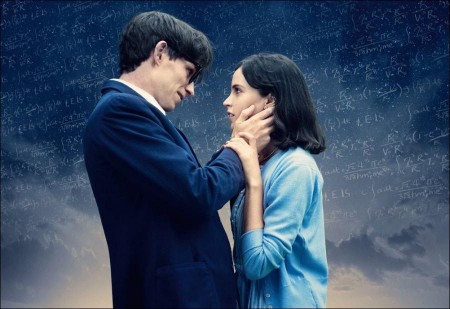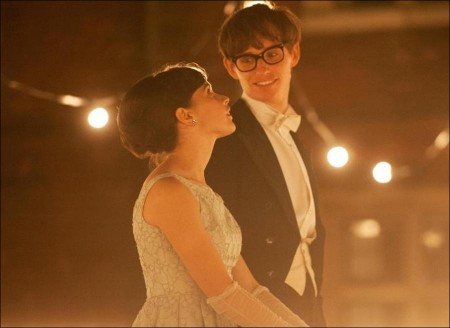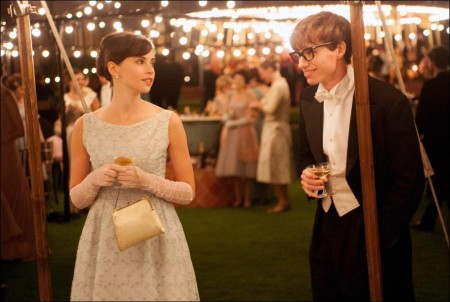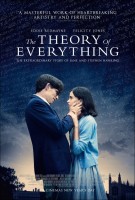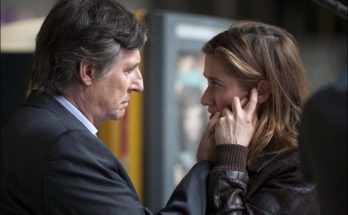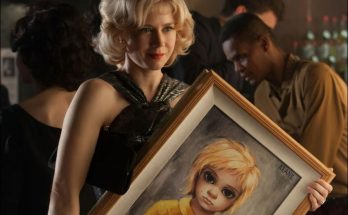Taglines: The extraordinary story of Jane and Stephen Hawking.
Starring Eddie Redmayne and Felicity Jones, this is the extraordinary story of one of the world’s greatest living minds, the renowned astrophysicist Stephen Hawking, who falls deeply in love with fellow Cambridge student Jane Wilde.
Once a healthy, active young man, Hawking received an earth-shattering diagnosis at 21 years of age. With Jane fighting tirelessly by his side, Stephen embarks on his most ambitious scientific work, studying the very thing he now has precious little of – time. Together, they defy impossible odds, breaking new ground in medicine and science, and achieving more than they could ever have dreamed.
The film is based on the memoir Travelling to Infinity: My Life with Stephen, by Jane Hawking, and is directed by Academy Award winner James Marsh (“Man on Wire”).
The Theory of Everything is a British romantic biographical film directed by James Marsh and penned by Anthony McCarten. The film was inspired by the memoir Travelling to Infinity: My Life with Stephen by Jane Hawking, which deals with her relationship with her ex-husband theoretical physicist Stephen Hawking, his diagnosis of amyotrophic lateral sclerosis (ALS), and his success in physics.
A Brief History
Time has always been a subject of fascination to the brilliant astrophysicist Stephen Hawking: when the universe began, when it will end, and all points in between. The renowned professor’s book A Brief History of Time has sold over 10 million copies worldwide. But the concept of time struck him on a most personal level when, in 1963 at the age of 21, he was given two years to live after a diagnosis of motor neuron disease (MND, which is related to ALS; the latter is commonly known as Lou Gehrig’s disease). He wanted life, even with the impending constraints on his speech and movement. He wanted love, with the woman who would be his wife. Against the odds, he would have all of that and more.
No matter how strong his will, he could not have done it alone; he was accompanied on his journey by Jane Wilde, soon to be Jane Hawking. A brilliant mind in her own right, she dedicated herself to Stephen and their marriage and family.
Outliving his diagnosis decade after decade, Stephen continued to explore the outer limits of theoretical physics, leading to further breakthroughs. By the 21st century, his name was being spoken of in the same breath as Albert Einstein’s.
Screenwriter and producer Anthony McCarten has long been fascinated by Professor Hawking, in particular the time and effort it took for the severely physically compromised man to write his seminal book. “He has illuminated physics for the world, and there is a sense of the profound in all his work,” says McCarten. “That was enhanced by Stephen’s own physical situation, which only allowed him to compose his communications at the agonizing rate of one word per minute; here, in one man, was an unprecedented juxtaposition of extraordinary mental prowess and extraordinary physical incapacity.
“His mind continued to open up one frontier after another in relentless exploration, so he was contracting yet also expanding which was apt for a man whose life is devoted to studying the universe.”
McCarten was moved to read Jane Hawking’s memoir Travelling to Infinity: My Life with Stephen. He discovered “a marvelous love story between two people, incredibly intense and challenged in the extreme: first by the physical decline, and then by the advent of fame in their lives. When news of his imminent death proved exaggerated, and two years became 10, then 20, their situation demanded that their love take bold and unorthodox forms if it was to survive. Theirs was a love story without precedent.”
Envisioning the couple’s story as a feature film, he began writing a screenplay adaptation of the book with no guarantees in place; he met with Jane at her home to discuss the project. “I will always be grateful to her for answering that buzzer and welcoming me inside. No promises were made that day, and our dialogue continued over time,” he notes.
After multiple drafts, he was introduced to producer Lisa Bruce via their mutual ICM agent, Craig Bernstein. Knowing of Stephen Hawking only as the brilliant man in the motorized wheelchair who communicated via a mechanical voice activated device, Bruce found the script to be a revelation.
She remarks, “A lot of people don’t even think about Stephen Hawking’s domestic life, much less know that he walked and talked, and they certainly don’t know that he fathered children. When you look deeper into his life, you see so much more than just the genius: you find a father, a husband, and under it all an eternal optimist. But, for me, the most powerful element of this story was the sense that he would never have achieved what he did without a partner like Jane.”
What also struck Bruce was how Stephen and Jane’s love story was simultaneously unique and universal. She explains, “Nobody has ever lived what the Hawkings experienced as a couple; here were two young people with their whole lives in front of them, full of nothing but promise, and then this bomb drops on them with Stephen given two years to live in effect, a death sentence delivered at age 21. Yet, instead of running from it, they chose to face this impossible life together; in that regard, I think they are one of the most inspirational love stories of our time.”
The marriage would evolve and adapt while Stephen made significant strides in his work. Bruce notes, “Jane and Stephen’s relationship in this movie spans 25 years, as we seem them achieve things the most able bodied among us can’t even imagine. On that level, it’s unique. At the same time, what is completely universal is loving and caring for someone.”
“Jane had done this extraordinary thing,” says McCarten. “She said to Stephen, yes I’ll marry you and I’ll take that ride with you. This was essential to Stephen, since, as he admits, he was in a bit of a dark hole at the time. He was just beginning his life when he was told that it would end very soon. Despite the uncertainty, with Jane he entered into marriage joyfully and optimistically.
“It was a personal and professional turning point all at once. With Jane’s help, he overcame his depression, and the ticking clock of his prognosis sparked his mental process. In a very short time he began to achieve his full potential as an astrophysicist. The Theory of Everything charts this intellectual ascent alongside his physical deterioration; through it all Stephen somehow finds the courage and internal drive not only to cope but also to actually prevail which is astonishing.”
It would take McCarten and Bruce several years to secure the full legal rights, and the blessing and permission from Jane and Stephen, to allow this love story to become a movie. During those years they worked tirelessly together on the story, promising to eschew sensationalizing or sentimentalizing the couple’s history, and committing to conveying the complexity of the marriage.
McCarten asserts, “For them to have marched through that difficult terrain together and had a marriage that lasted decades was nothing less than a triumph. Stephen and Jane both show us all what human beings are capable of when they set their minds to something. But in writing the script, I had to allow for showing their moods and frustrations that were completely understandable. Our film celebrates Stephen, but it doesn’t try to mythologize him; he had very strong negative emotions about the loss of his physical powers and we show that, as well as the highs and lows of the marriage.
Oscar winning filmmaker James Marsh joined the project. The award winning Working Title Films producers Tim Bevan and Eric Fellner, with whom Bruce had made the telefilm Mary and Martha, also came on board.
Bruce notes, “Tim and Eric cared deeply about this story, and about getting our telling of it to deliver the truth and emotional power that was in the Hawkings’ lives. The support of Working Title was overwhelming.
“Everyone felt that, given the way he has empathized with real life people in his films, James would have the sensitivity needed to tell this story.”
Marsh, who had won the Academy Award for his documentary Man on Wire, was continuing to work on both narrative and nonfiction features. When he received the script, the director admits, “I had the fixed image of Stephen Hawking as the great scientific mind with the wheelchair and the voice machine.
“But I quickly became infatuated with Anthony’s take. He found the fascinating point of view, which was to tell the story from the perspective of the woman who was falling in love with an able bodied man; she then makes the critical choice to stay with the man she loves when he is diagnosed with a terminal illness. The moving and unusual love story that Anthony wrote was quite original in demonstrating what it’s like to live with someone who is both disabled and a genius, and the burdens it placed on Jane’s career and on her as a wife and mother. This was very rich territory.”
The director was also drawn to The Theory of Everything because its spirit recalled Man on Wire for him; both are about men who defy conventional human boundaries and limitations. He muses, “There is definitely an affinity, and there is also a cosmic irony: Stephen is physically constrained and yet mentally he is able to go wherever he wants. His mind can and does travel to the outer limits of the universe, but his body is confined.”
The tonal challenge that Marsh zeroed in on was that “Stephen Hawking’s story, while bittersweet, is not a tragedy even though a near fatal illness befalling a young able bodied man with promise has all the elements of one. It’s Stephen’s character which takes that out of the equation; his defiance of the illness with humor, perseverance, and grit makes this story the opposite of a tragedy in the end.
Already a man who has upended our concept of the creation of the universe, Professor Hawking continues to challenge and inspire us well into a new millennium.
The Theory of Everything
Directed by: James Marsh
Starring: Eddie Redmayne, Felicity, Emily Watson, David Thewlis, Charlie Cox, Charlotte Hope, Anastasia Harrold
Screenplay by: Anthony McCarten
Production Design by: John Paul Kelly
Cinematography by: Benoît Delhomme
Film Editing by: Jinx Godfrey
Costume Design by: Steven Noble
Set Decoration by: Claire Nia Richards
Music by: Jóhann Jóhannsson
MPAA Rating: PG-13 for some thematic elements and suggestive material.
Studio: Focus Features
Release Date: November 7, 2014
Visits: 521
